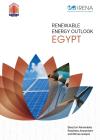

-
-
IRENA (2018), Renewable Energy Outlook: Egypt, International Renewable Energy Agency, Abu Dhabi.
Copied
/-/media/Files/IRENA/Agency/Publication/2018/Oct/IRENA_Outlook_Egypt_2018_En.pdf
Copied
Renewable Energy Outlook: Egypt
Newsletter
التقرير الكامل متوفر أيضا باللغة العربية.
Egypt’s economic development hinges on the energy sector. To meet burgeoning energy demand, the government’s Integrated Sustainable Energy Strategy, ISES 2035, involves stepping up the use of renewables and improving energy efficiency in the power sector. The government has set targets for renewables to make up 42% of the country’s electricity mix by 2035, based on rapid solar and wind deployment. This study by the International Renewable Energy Agency (IRENA) examines the policy, regulatory, financial and capacity-related challenges that the country has to address to meet such targets.
The report combines IRENA’s Renewables Readiness Assessment (RRA) methodology, based on country-led consultations with stakeholders, with an in-depth REmap analysis of the country’s renewable energy prospects in the years ahead. REmap – IRENA’s global roadmap to scale up renewables – identifies untapped potential and quantifies other factors, such as costs, investment needs and the effect on externalities related to air pollution and the environment.
Egypt could realistically, and cost-effectively, supply 53% of its electricity mix from renewables by 2030, double the share to be expected from current plans and policies, the report finds. With renewable power, heat and fuels all factored in, renewables could provide 22% of Egypt’s total final energy supply in 2030, up from just 5% overall in 2014.
While investments in renewables would have to increase, the proposed shift would cut the country’s energy costs by USD 7 per megawatt hour (MWh) on balance, even before considering the health benefits of reducing air pollution.
In line with these assessments, Renewable Energy Outlook: Egypt recommends seven key actions:
- Update energy and power sector strategies to reflect the growing cost advantages and other benefits of renewables;
- Reflect the potential of biomass in future updates of the energy strategy;
- Streamline regulations and clarify institutional roles and responsibilities for wind and solar development;
- Reform the current market framework to improve project bankability;
- Bundle renewable energy projects to strengthen risk mitigation and ensure their financial viability;
- Conduct comprehensive measurement campaigns for solar and wind potential;
- Develop a master plan for enhancing local manufacturing capabilities and create a vibrant domestic renewable energy industry.




